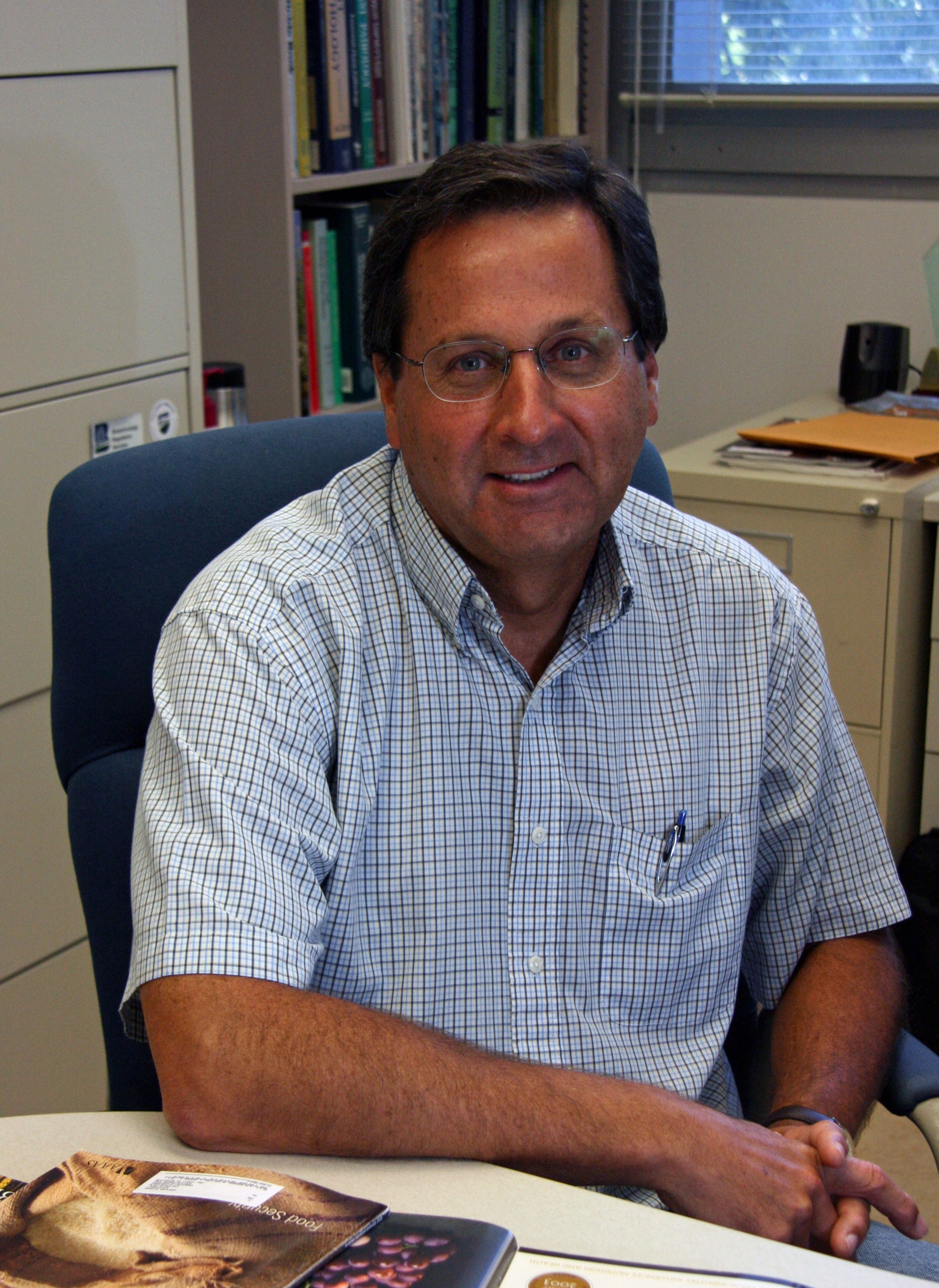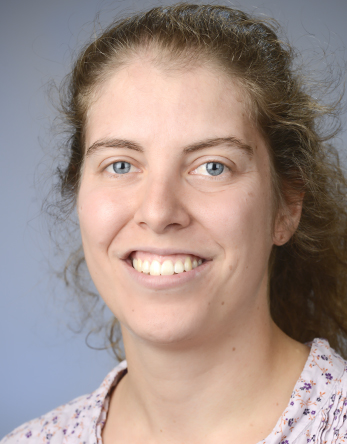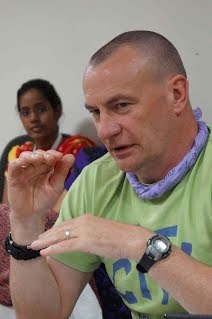
Sharif Aly
Sharif Aly is a veterinarian and epidemiologist who studies health, disease, and welfare primarily using herd health and epidemiological analytical tools. He is interested in vector-borne disease of cattle and is active in training residents and graduate students in the field.
Faculty Page

Chris Barker
Chris Barker's research group studies the factors that cause outbreaks of mosquito-borne viruses. They work closely with partners in public health and mosquito control on research to inform policy for disease prevention. Currently, they are studying the spread of invasive mosquitoes and chikungunya virus and the impacts of extreme drought on West Nile virus risk in California.
Faculty Page

Nicole Baumgarth
The Baumgarth lab is investigating immunity to Lyme disease, a tick-transmitted infection caused by the spirochete Borrelia burgdorferi that affects humans but also animals such as dogs and horses. Their studies have shown that B. burgdorferiactively suppresses long-term immune responses usually induced to an infection, explaining the relatively high rate of reinfections observed in endemic areas. Their current research is focused on identifying host-targets of the immune suppression in order to develop therapies that can strengthen immunity to this pathogen.
Faculty Page

Richard Bostock
The Bostock laboratory works on insect-vectored fungal pathogens of plants. Specifically, Dr. Bostock and his group work on thousand cankers disease of walnuts, which is caused by the fungal pathogen, Geosmithia morbida, and carried by the walnut twig beetle, Pityophthorus juglandis. Dr. Bostock also collaborates with USDA Forest Service entomologist Dr. Steven Seybold and others to study the chemical ecology of the beetle, with the overall goal to disrupt the beetle’s host selection behavior. In addition, the Bostock lab studies predisposing abiotic and biotic stresses that may influence host attraction to the beetle vector and susceptibility of the host to the pathogen with the overall goal to develop novel strategies for disease intervention.
Faculty Page

Aaron Brault
Aaron Brault’s group focuses on the interaction of arthropod-borne viruses, including West Nile virus (WNV), with their vertebrate and invertebrate hosts through the use of molecular tools and vertebrate models of infection and disease. The group’s expertise includes a unique mixture of field biology, entomology, molecular biology, and genetics. Current studies include the epidemiology of WNV, the factors that contribute to WNV virulence, temperature constraints on viral replication as well as novel mechanisms for the development of live attenuated vaccine constructs.
Faculty Page

Clare Casteel
Most viruses that attack plants depend on insect vectors for transmission, and ultimately for survival. Casteel's research focuses on the different ways pathogens can alter plant-insect interactions to increase their own transmission and the key molecular mechanisms responsible for these relationships. By better understanding these relationships, she hopes to improve the safety and sustainability of current control strategies for plant diseases in agricultural systems.
Faculty Page

Joanna Chiu
The main focus of our research is to understand the mechanisms underlying the regulation of animal circadian clock and its control over organismal physiology and behavior. Leveraging the molecular and genomic tools we have developed in studying circadian gene regulation in Drosophila, we have recently developed collaborative projects with Dr. Shirley Luckhart to examine epigenetic regulation of vector competence in the Malaria mosquito Anopheles gambiae and other closely-related species.
Faculty Page

Bruno Chomel
Students in Bruno Chomel's laboratory are working on various topics related to Bartonella infections in domestic animals and wildlife around the world with projects in the U.S., Mexico, the Philippines and North Africa. They are looking at the dynamics of infection and the role of various vectors, such as biting flies and bats or fleas and dogs. Identification of new Bartonellaspecies in wildlife reservoirs is also part of the research.
Faculty Page

Gitta Coaker
The Coaker laboratory is investigating plant innate immunity against bacterial pathogens in model and crop plants. With respect to vector borne diseases, we are currently investigating the huanglongbing (HLB) associated bacterium Candidatus Liberibacter asiaticus which is transmitted the Asian citrus psyllid insect vector. HLB is a devastating citrus disease that is well established in Florida and Texas. We are examining the role of secreted plant proteases and secreted bacterial proteins for disease development.
Faculty Page

Lark Coffey
Lark Coffey's team focuses on the ecology and evolution of arthropod-borne viruses including West Nile and chikungunya that are a significant cause of human disease, with no vaccines or treatment beyond palliative care. Their goal is to understand patterns of viral molecular evolution in enzootic and epidemic settings and the viral genetic factors that promote emergence of epidemic variants via host range changes. Studies also focus on how intrahost arboviral genetic diversity generated by error-prone viral replication to produce minority variants influences infectivity and transmissibility in mosquito and vertebrate hosts. The team is also developing approaches to improve arbovirus surveillance.
Faculty Page

Patricia Conrad
Pat Conrad’s laboratory takes a One Health research approach to global human, animal and environmental health problems—including tick-borne protozoal parasites, most notably Babesia in humans, wildlife, pets and livestock. She is committed to research mentorship of undergraduate, professional and graduate students, and the development of innovative educational approaches to promote inter-professional learning and engagement, particularly relating to global health.
Faculty Page

Anthony Cornel
The Cornel lab is focused on population genetics and insecticide resistance of major vectors of human malaria in Africa and Brazil in collaboration with Gregory Lanzaro and Yoosook Lee. Other efforts are underway to study inter-epizootic zoonotic diseases of wildlife in South Africa, with a particular focus on competence, behavior, and systematics of arbovirus vectors. In addition, work on avian malaria hosts and vectors has revealed co-infecting parasite species and lineages that are likely to affect the diversity of parasite communities in time and space.
Faculty Page

Bryce Falk
The Falk lab has three main research areas in plant-vector borne diseases. The first area in molecular cell biology and genetics of plant viruses includes efforts ranging from diagnostics to natural diversity to novel strategies for genetic control. The second area combines multidisciplinary, collaborative efforts to express desirable nucleic acids/proteins in plants and plant cells for reverse genetic analysis of specific plant types. The third area is focused on the long term goal of identifying and using RNA interference to control insect vectors of plant pathogens.
Faculty page

Janet Foley
Students and affiliates in Janet Foley's laboratory are working on a diversity of projects relating to the ecology of vector-borne diseases with emphases on acarids (mites and ticks). Recently, they have worked collaboratively with agency and non-profit organization biologists to address devastating mange epidemics in eagles, kit foxes, bobcats and squirrels. Although each of the mite species that cause mange in these various hosts is different, they are concerned about climate or other broad scale ecological changes that may contribute to these mange epidemics.
Faculty Page
Robert Gilbertson
Research in Dr. Gilbertson’s lab is focused on insect-transmitted viruses of plants, including the thrips-transmitted Tomato spotted wilt virus and the leafhopper-transmitted Beet curly top virus. Along with several related international projects, the goals of this research are to develop a better understanding of aspects of the biology of insect vector-virus interactions and to help farmers better manage these diseases. Dr. Gilbertson teaches or co-teaches PLP 123 (Plant Virus Vector Interactions), PLP 120 (Introduction to Plant Pathology), and PLP 228 (Plant Bacteriology) and contributes lectures to PLP 230 (Plant Virology), MIC 262 (Advanced Virology), and PLS 105 (Integrated Pest Management).

Cecilia Giulivi
Research in the Giulivi laboratory is focused on mitochondria, bioenergetics and free radical biochemistry in several neurological and neurodegenerative disorders such as autism, fragile X tremor and ataxia syndrome (FXTAS), and Huntington’s disease. These mechanisms are explored using a variety of biological models (isolated mitochondria, primary cell culture, established cell cultures, animal models including conditional knock-in and transgenic, human patients’ samples). The same approaches are being used for vector-borne diseases with studies on mitochondrial regulation of infection and transmission of malaria parasites and also of the protozoan pathogens of Chagas’ disease.
Faculty Page
Bruce Hammock
Dr. Hammock is member of the National Academy of Sciences and a leader in the fields of drug metabolism and insect biology. At UC Davis, he directs a laboratory of more than 40 scientists and students in the Department of Entomology and Nematology. Dr. Hammock holds a joint appointment in the UC Davis Comprehensive Cancer Center and also directs the UC Davis Superfund Research Program, which has been continually funded since 1987. Dr. Hammock and his many collaborators and trainees have published more than 900 peer-reviewed publications that collectively reflect a multidisciplinary, integrated approach to basic questions of biology and biochemistry that have practical implications for improving both human and environmental health. He is an expert on pesticide toxicology and resistance and has published on mechanisms of resistance in mosquitoes to pesticides and on new targets for biological and chemical control.
Faculty Page

Ashley Hill
As an associate professor in VME and an epidemiologist at CAHFS, Dr. Hill has general research interests in diagnostic testing for infectious diseases of livestock and other species. She is Chair of the Preventive Medicine Graduate Group and actively participates in student-led research in vector-borne disease.
Faculty Page

Emir Hodzic
Emir Hodzic directs the Real-time PCR Research and Diagnostics Core Facility offering diagnostic and research services to the veterinary and academic communities—including diagnostics of infectious agents (such as vector-borne diseases), and research for gene expression. With over 15 years of experience, the Real-time PCR Core Facility remains a leading competitor in the field of molecular detection.
Faculty Page

Lynn Kimsey
Dr. Kimsey teaches introductory entomology, the prerequisite for medical entomology, the biology of parasitism and other insect related courses. In addition, Dr. Kimsey is the Director of the Bohart Museum of Entomology, which houses the fourth largest mosquito collection in the world, along with large collections of other pathogen vectors, such as tick, sandflies and mites. These collections are particularly important as repositories of research vouchers to make it possible to confirm species studied and replicate research. In addition, Dr. Kimsey and Dr. Robert Washino are revising and updating the monograph, “Mosquitoes of California”, an invaluable resource for both researchers and professionals.
Faculty Page

Greg Lanzaro
The Vector Genetics Laboratory (VGL) at UC Davis deals with research and training in the areas of population & molecular genetics, genomics and bioinformatics of insect vectors of human and animal disease. They have developed a program aimed at expanding knowledge that may be applied to improving control of vectorborne diseases and that addresses problems of interest in the field of evolutionary genetics. The Laboratory is directed by Drs. Gregory C. Lanzaro and Yoosook Lee in the Dept. of Pathology, Microbiology and Immunology of the School of Veterinary Medicine and Dr. Anthony Cornel in the Dept. of Entomology and Nematology at UC Davis.
Faculty Page

Sharon Lawler
Vector ecology research in the Lawler lab focuses on the efficacy and non-target effects of mosquito control methods, including conventional pesticides, biologically-derived pesticides, predators, and suppression of aquatic weeds that harbor mosquito larvae.
Faculty Page

Yoosook Lee
The Vector Genetics Laboratory (VGL) at UC Davis deals with research and training in the areas of population & molecular genetics, genomics and bioinformatics of insect vectors of human and animal disease. They have developed a program aimed at expanding knowledge that may be applied to improving control of vectorborne diseases and that addresses problems of interest in the field of evolutionary genetics. The Laboratory is directed by Drs. Gregory C. Lanzaro and Yoosook Lee in the Dept. of Pathology, Microbiology and Immunology of the School of Veterinary Medicine and Dr. Anthony Cornel in the Dept. of Entomology and Nematology at UC Davis.
Faculty Page

John Madigan
John Madigan has been working with tick-borne anaplasmosis and equine infectious disease since the 1970s, shortly after this disease was first discovered in horses. He also has been a leader of the team investigating the ecology of Potomac horse fever in the western US. John remains actively engaged in clinical case response and student and resident training in multiple facets of tick-transmitted disease, while providing leadership in emergency response for animals in life-threatening situations.
Faculty Page

Esteban Soto Martinez
Dr. Martinez studies One Health, Aquatic Animal Disease, and Fish Disease through a combination of microbiological, molecular, and epidemiological studies. He is interested in student training and research related to vector-borne disease in aquatic ecosystems and common ecological themes among vector-borne pathogen transmission in various ecosystems.
Faculty Page

Beatriz Martinez-Lopez
As an epidemiologist and mathematical model, Dr. Martinez-Lopez is actively engagaed in a diverse set of research projects addressing vector-borne and other disease risks in livestock, wildlife, and other species. Much of her work involves students and post-doctoral trainees, is highly international, and aims to understand and manage widespread disease risk.
Faculty Page

Jonna Mazet
Jonna Mazet and associates in her lab focus on the application of One Health methods for global health, especially emerging infectious diseases and those that affect people, domestic animals, and are relevant to threatened and endangered species conservation. Their interests in vector-borne disease relate to new pathogen discovery worldwide, impacts of vector-borne disease on One Health, improving techniques and capacity for disease diagnostic capacity, and engaging students and stakeholders in One Health work.
Faculty Page

Neil McRoberts
Research in the Quantitative Biology & Epidemiology (QBE) lab is concerned with the dynamics of plant diseases from the microscopic to the global scales. We are interested in how plant pathogens and plants interact at an organismal level, how such interactions result in the reproduction and dispersal processes of pathogens, and how this results in disease epidemics. We study disease dynamics and how epidemics drive grower and crop manager decisions; many problems we work on involve the complication of vector behavior and population dynamics. All of these complex feedback interactions contribute to the sustainability of food production and its environmental impact, setting an overall context for our work.
Faculty Page

Eliska Rejmankova
Research in Eliska Rejmankova’s wetland lab is focused on the structure and function of macrophytes in wetland and aquatic ecosystems. Although there is not currently any project related to the ecology of larval stages of malaria transmitting mosquitoes, the lab can still provide information on the habitat role of these ecosystems for various disease vectors.
Faculty Page
David Rizzo
Dave Rizzo's laboratory focuses on understanding the ecology and management of forest tree diseases in the coastal ranges and Sierra Nevada Mountains. Dr. Rizzo also links to CVEC via his role in the Global Disease Biology undergraduate major that is a collaboration between the College of Agricultural and Environmental Sciences, the School of Medicine and the School of Veterinary Medicine.

Woutrina Smith
Dr. Smith is an Associate Professor of Infectious Disease Epidemiology in the School of Veterinary Medicine. She teaches in the professional DVM, graduate, and undergraduate programs, where she brings her field and laboratory research experiences into the classroom to bring real world context to the learning process. Vectorborne diseases have fascinating disease dynamics that are discussed in her classes and investigated in her research program. Dr. Smith’s infectious disease epidemiology research program utilizes a One Health approach to bring together professionals and stakeholders across natural and social science disciplines. Her active research projects are in Africa, Asia, and California, using a multidisciplinary team approach to solve complex health problem in innovative ways.
Faculty page

Lisa Tell
Dr. Tell's laboratory is working collaboratively with academic and zoological institutions and federal agencies to investigate hummingbird hemoparasitism. Specifically, her work is focused on how climate and urbanization influences pathogen dynamics in hummingbirds. Recent research directions include understanding disease and parasite dynamics in hummingbirds, including pox and other pathogens that could be vector-borne and mite infestation as well.
Faculty page

Renee Tsolis
Members of Renee Tsolis' laboratory are working to define effects of childhood malaria on resistance to common infections with bacteria such as non-typhoidal Salmonella species. While these bacteria commonly remain localized to the intestine and cause a self-resolving diarrheal disease in healthy individuals, children with acute or recent malaria are at increased risk of developing life-threating bloodstream infections. Together with Shirley Luckhart's laboratory, the group's work has revealed several effects of malaria on the immune system that compromise control of Salmonella infection. These findings underline that interventions to reduce malaria will have additional positive outcomes for child health by reducing the prevalence of co-infections.
Faculty Page

Michael Turelli
The Turelli lab has been partially funded by the Bill and Melinda Gates Foundation “Eliminate Dengue” project since 2008. The Eliminate Dengue group is currently conducting field trials in Australia, Vietnam, Indonesia, Brazil, and Colombia using Wolbachia-transinfected Aedes aegypti to control the spread of dengue. Dr. Turelli’s primary expertise and interests are in evolutionary genetics, including empirical analyses of the coevolution of Wolbachia and various Drosophila hosts.
Faculty Page

Koen Van Rompay
Koen Van Rompay (D.V.M, Ph.D) has over 24 years of experience working with non-human primate models of infectious diseases at the California National Primate Research Center. The main focus of his research has been the SIV (simian immunodeficiency virus) macaque model of HIV infection, to study all aspects of pathogenesis (including transmission) and to perform preclinical testing of vaccines and drugs. He has also been involved in studies to investigate co-infection of rhesus macaques with SIV and malaria and in adapting protocols for non-human primate models of human malaria parasite infection.
Faculty Page
